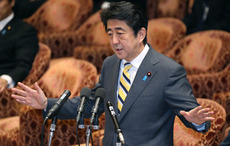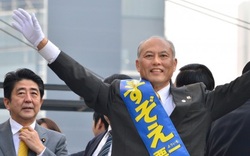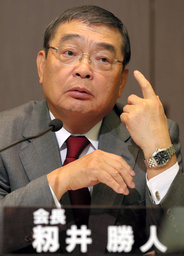 Source: blog.zige.jp
Source: blog.zige.jp Yet is this actually the case? Are younger voters in Japan apathetic towards politics, or have the usual standards for measuring political involvement missed a shift in voter activity among Japan’s youth? Statistics released by the Ministry of Internal Affairs and Communications following the Upper House elections of July last year (J, PDF) tend to support the conclusion that Japan’s youth are moving away from active involvement in politics. Voter participation among 20-24 year olds was the lowest of all age groups at just 31.18%, and no other age group up to 40 years of age surpassed the 50% mark. By contrast, voter participation rates among older age groups exceeded 60% or more (particularly those among the recently retired). Based on this result, Ikegami’s thesis appears to be solid.
This particular article (J) from Nipponseiji.com also gives pause for thought. In the 2012 Lower House elections, only 37.9% of voters aged in their 20s turned out to vote, less than half that of those aged in their 60s. However, when the Cabinet Office’s Policy on Cohesive Society Office released its findings on global youth attitudes towards various social issues in 2010 (J) (a survey conducted every five years), it found that Japanese youth had the highest level of interest in politics compared to youth in South Korea, the US, the UK, and France. In another barrage of statistics, the Association for Promoting Fair Elections released a report into the 2012 Lower House election which surveyed the attitudes towards politics of 3,000 voters aged over 20. It found that among those in 20s, only 14.4% had any interest in the election, rising to 31.9% among those in their 30s (J, PDF).
So what does this tell us? On the one hand, it does appear as though youth attitudes towards politics were much more positive in the early months of the DPJ government than they were before the Lower House elections of 2012, when voter dissatisfaction with the DPJ resulted in them being replaced by the LDP/New Komeito coalition. Perhaps this too then explains why youth voter turnout during last year’s Upper House election was so limited – the return to an LDP/New Komeito government cannot have inspired the youth of Japan to take an interest in politics, particularly when the issues being discussed had little direct relevancy to the youth vote (although that doesn’t really explain why the youth vote had more interest in politics in 2010 either, given the fact that the issues at the time still revolved around questions of social security and foreign relations and were of little relevance to youth).
There are many questions left unanswered by all of this. For example, what is the cause of all this apathy, and has anything been done to address it on a federal level (the picture accompanying this post does suggest so, but how effective has that campaign been)? Do the combined effects of a falling birthrate and aging society mean that younger Japanese no longer believe that the nation’s destiny lies in their hands but in those of their parent’s generation? Is it a consequence of social attitudes towards politics, that since only the wealthy or party-endorsed candidates have any chance of being elected, political involvement is a waste of time, and since these candidates are only interested in re-election, what is the point of trying to get them to endorse youth issues when all they concentrate on is securing votes from the largest group of voters who will turn up on election day? I’m quite sure that some form of social research must have been done on these questions, but I haven’t yet had the time to search for it.
However I did find this. According to this particular piece that appeared on the Giin-navi site in 2012 (J), apathy towards politics amongst younger voters began to climb following the establishment of greater economic security and economic growth. Political parties didn’t help matters either, for whereas youth in the 50s and 60s had given support to Communist or Socialist ideals in great numbers, the increasing wealth of society as a whole took the sheen off Marxism/Leninism, and encouraged voters to accept the status quo as a necessary condition for prosperity. With few ideals left to fight for, political parties splintered and reformed as separate entities, different in name but essentially promoting the same message. As Japan’s domestic political landscape remained virtually unchanged for half a century (except for a brief period in 1993-1995), people’s expectations towards politics and politicians appears to have dropped off despite the economic malaise of the 1990s.
This is only part of the answer, I feel. I may return to this subject again at a future date, certainly after I have gathered further resources that can explain in detail how generational differences, economic circumstances, ideology, social expectations, and political activity itself have all contributed to a ‘greying’ of Japan’s voter base.



 RSS Feed
RSS Feed